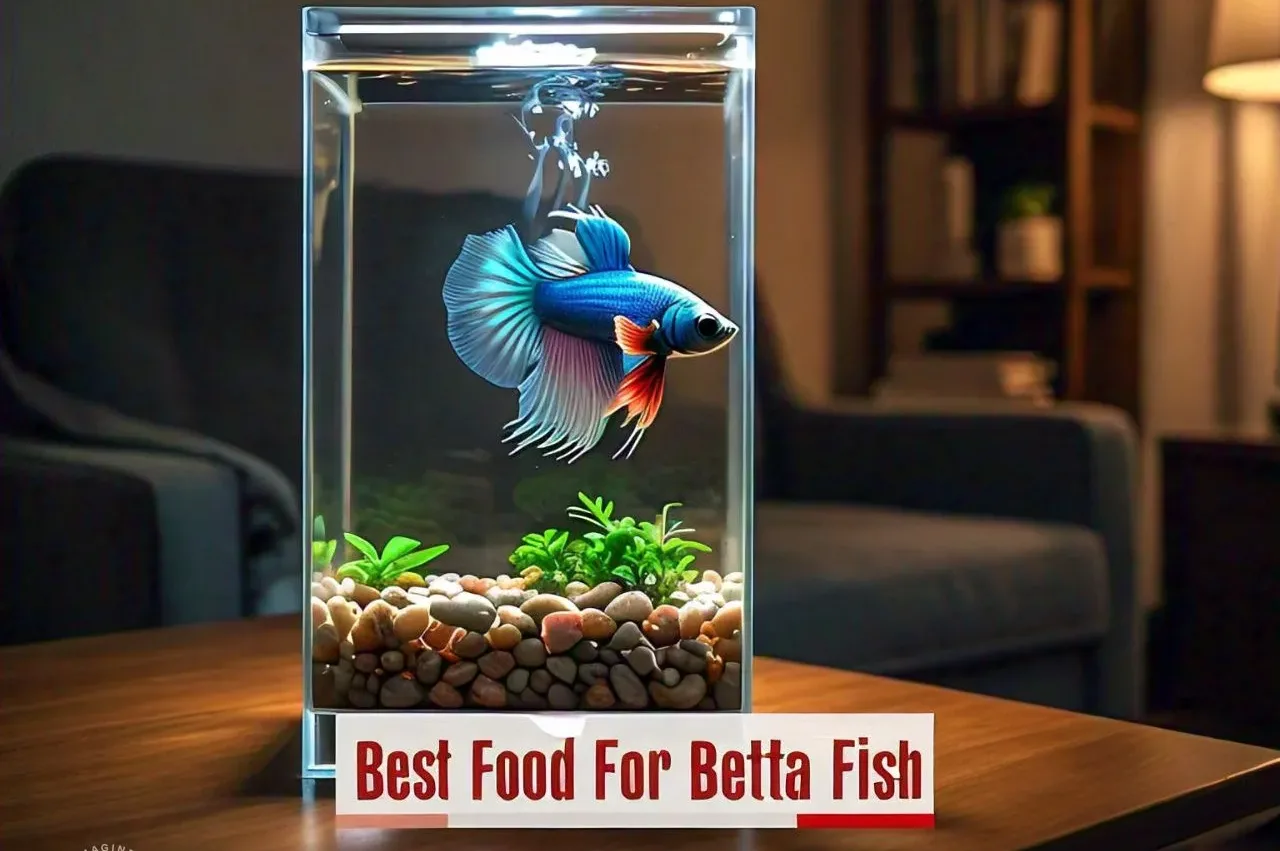Betta fish are beautiful, colorful pets that bring joy to any home. Feeding your Betta the right foods is important to keep it happy and healthy. But what exactly do Betta fish love to eat? Don’t worry, we’ve got you covered.
This simple guide will help you understand what foods are best for your Betta fish and how to feed them properly. Let’s dive in and learn how to keep your Betta fish well-fed and content!
What is The Best Food To Feed My Crown Tail Betta Fish?
The best food for your betta fish includes a mix of high-protein options to support their carnivorous diet. Here are some top choices:
Betta Pellets:
Specially formulated pellets for bettas contain the right nutrients. Look for high-protein varieties.
Frozen or Live Foods:
Bloodworms, daphnia, and brine shrimp are great sources of protein. Bettas love hunting live food.
Freeze-Dried Food:
Freeze-dried bloodworms or brine shrimp are convenient but should be soaked in water before feeding to avoid bloating.
Feed your betta small portions 1-2 times a day and avoid overfeeding to keep them healthy.
Best Food For Betta Fish Homemade
Boiled Peas
Peas help with digestion and prevent bloating in bettas. Boil a pea for a few minutes. Remove the skin. Mash the pea into small bits. Feed a small portion once or twice a week.
Egg Yolk
Egg yolk is rich in protein and fats, essential for betta growth. Boil an egg. Separate the yolk from the white. Mash a small amount of yolk. Offer tiny pieces to your betta.
Fish or Shrimp Paste
Betta fish need protein, and this is an excellent source. Boil small pieces of fish or shrimp. Mash them into a paste. Freeze in small portions. Defrost and feed a tiny bit once a day.
Vegetable Mix
Veggies provide vitamins and fiber. Boil vegetables like spinach or zucchini. Mash them into fine pieces. Feed only a small amount.
Betta fish don’t need to eat a lot; feed tiny portions. Rotate different types of food to give them a balanced diet.
What Is The Best Food Brand For Betta Fish
When choosing the best food for your betta fish, it’s important to find high-quality brands that meet their dietary needs. Betta fish thrive on a protein-rich diet because they are carnivores. Here are a few well-regarded brands:
Hikari Betta Bio-Gold:
This is a top choice because it’s specifically made for betta fish. It contains high protein and is designed to enhance your betta’s color.
Omega One Betta Buffet Pellets:
This brand uses whole fish as the main ingredient, which is a great source of protein. It also contains healthy fats that can keep your betta in good condition.
New Life Spectrum Betta Pellets:
These pellets contain a variety of nutrients, including high-quality proteins, which help promote growth and vibrant colors in your fish.
Aqueon Betta Pellets:
Aqueon offers a balanced diet for bettas and is also a budget-friendly option without compromising on quality.
What Food Pellets Are Best For Betta Fish
Insect Based Pellets
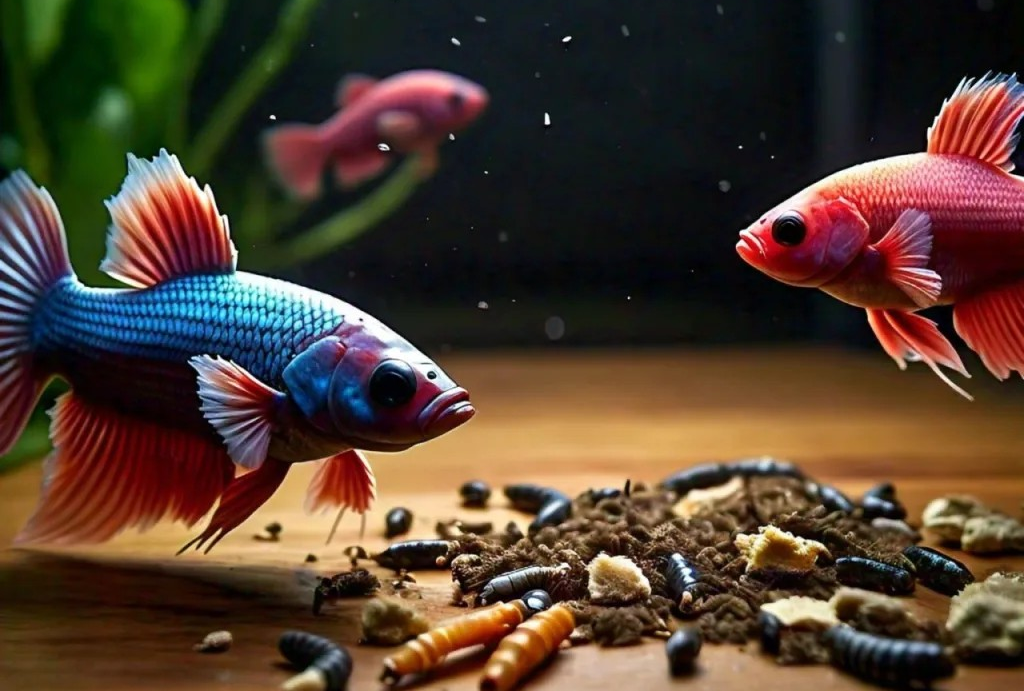
Insect-based pellets are a great choice for feeding your betta fish. They are made from insects like black soldier fly larvae, mealworms, or crickets, and offer many benefits:
- High Protein: These pellets are packed with protein, which is important for your betta’s growth and health.
- Natural Diet: Bettas eat insects in the wild, so these pellets are similar to what they would naturally eat.
- Brighter Colors: The nutrients in these pellets can help make your betta’s colors more vibrant.
- Eco-Friendly: Producing insect-based food is better for the environment than traditional fish food.
- Easy to Digest: Bettas can easily digest these pellets, which helps them stay healthy.
When buying insect-based pellets, check that insects are the main ingredient and avoid ones with unnecessary additives.
Feed your betta small amounts and remove any uneaten food to keep the water clean and your fish healthy.
What is The Best Frozen Food For Betta Fish
Freeze-Dried
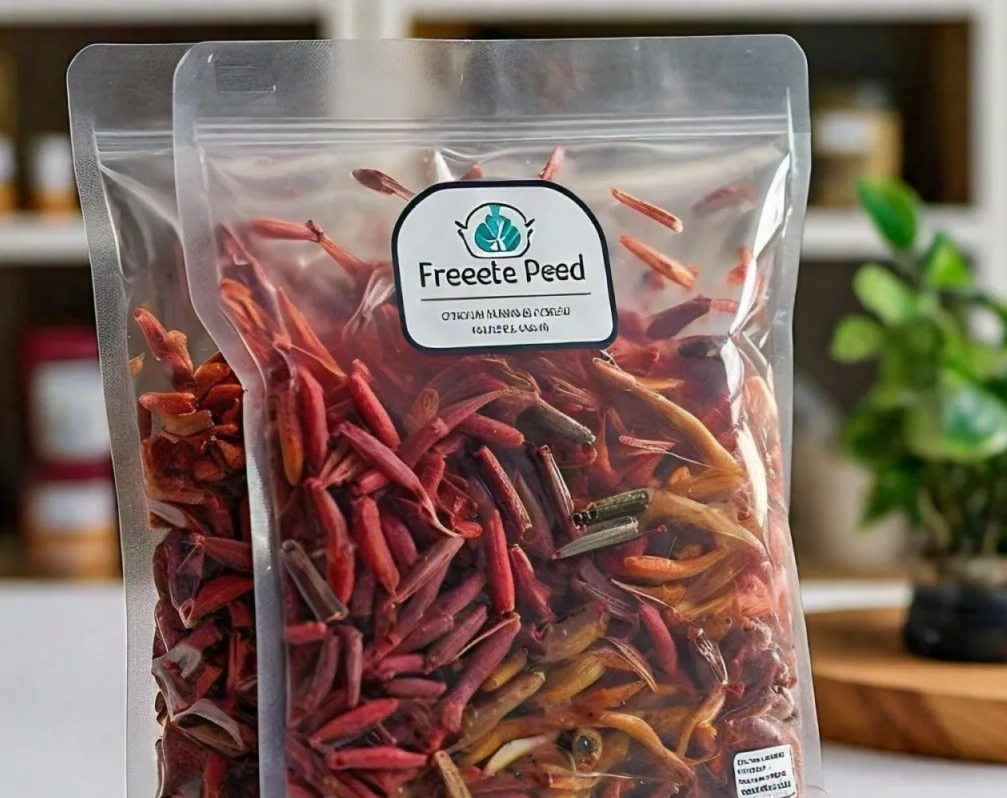
Freeze-dried betta food is made by removing water from the best natural foods like bloodworms, brine shrimp, or daphnia. This keeps the food nutritious and makes it last longer.
Benefits
- Nutrient-Rich: Keeps important nutrients for bettas.
- Long Shelf Life: Stays good for a long time without needing a fridge.
- Convenient: Easy to store and use.
- Less Mess: Cleaner than live or frozen food.
- Safe: There is less risk of bringing in parasites or bacteria.
Freeze-dried betta food is a handy and healthy choice for feeding your betta fish. It’s best used as part of a varied diet to keep your betta happy and healthy.
What is The Best Flake Food For Betta Fish
Fish flakes
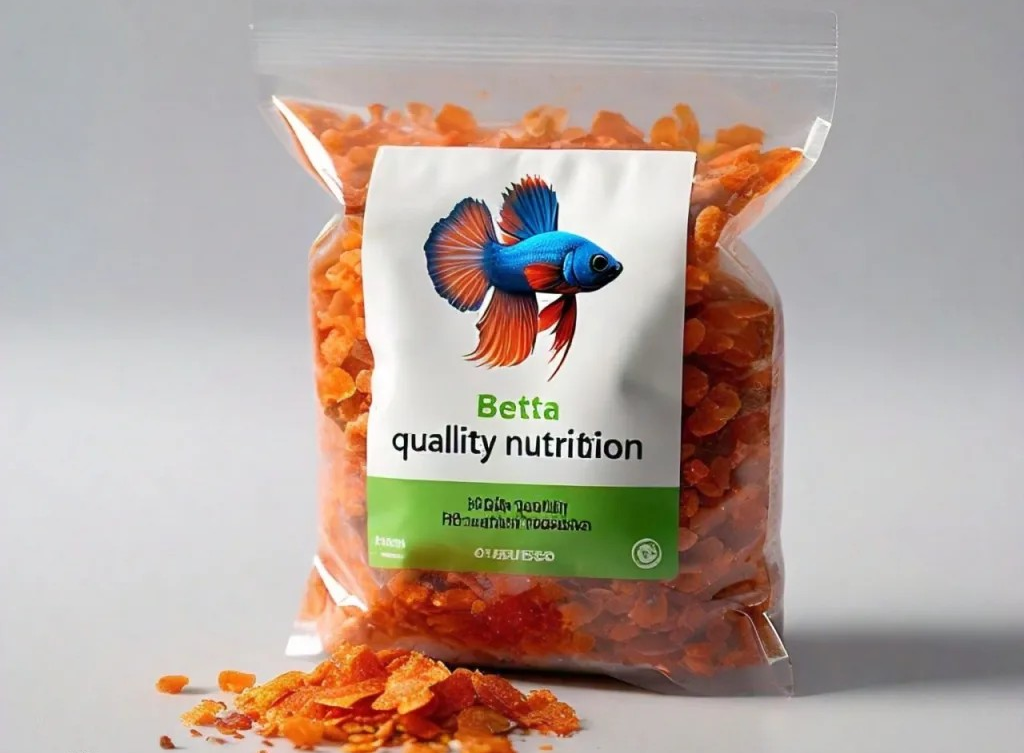
Fish flakes are a type of fish food made from small, flat pieces of processed fish or other sea creatures. Fish flakes float on the water’s surface, making them ideal for most types of pet fish that feed from the top.
They contain essential nutrients like proteins, vitamins, and minerals to keep fish healthy and vibrant.
- Usage: Simply sprinkle a small amount on the water surface. Feed only as much as the fish can consume in a few minutes to avoid overfeeding.
- Benefits: Fish flakes are easy to store, measure, and distribute. They promote healthy growth and vibrant colors in fish
By using fish flakes, you ensure your aquarium fish receive a balanced diet, making it easier to maintain their health and beauty.
Wingless Fruit Flies Live Food For Betta Fish
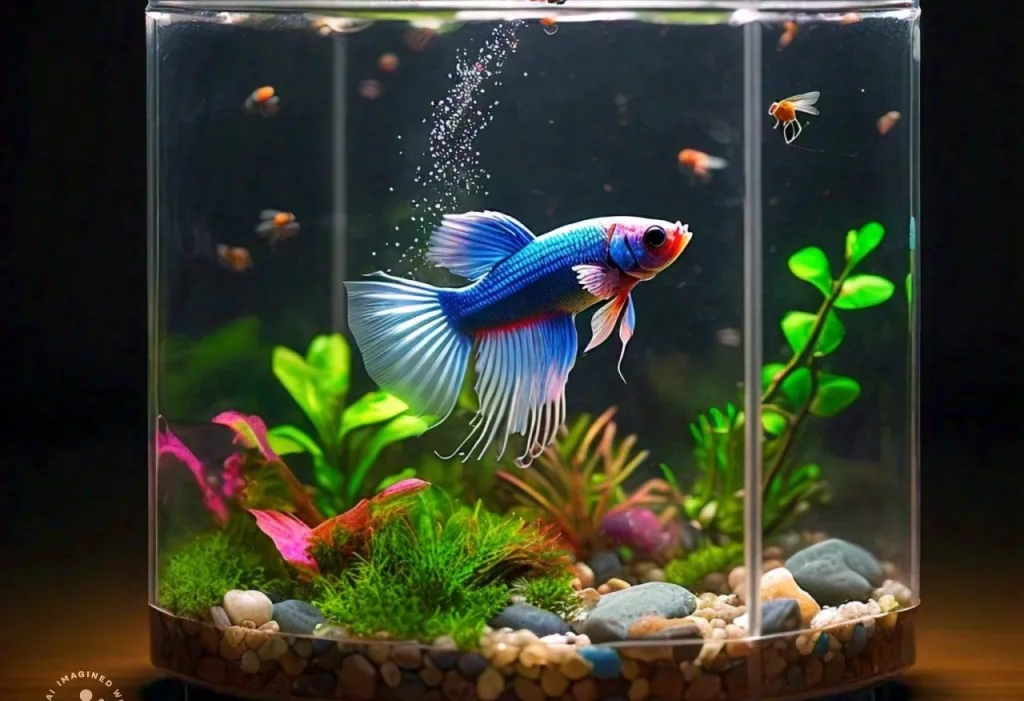
Wingless fruit flies are a great food choice for betta fish. Here are some reasons why they are good for your betta:
- Nutritional Value: Wingless fruit flies are rich in protein and essential nutrients, helping keep your betta healthy and vibrant.
- Natural Diet: In the wild, bettas eat small insects and larvae. Feeding them fruit flies mimics their natural diet.
- Stimulates Hunting: Betta fish enjoy hunting. Chasing live fruit flies can provide mental stimulation and exercise.
- Easy to Cultivate: You can easily breed wingless fruit flies at home. They don’t fly away, making them easy to manage.
- Size: They are the right size for betta fish, reducing the risk of choking.
To feed wingless fruit flies to your betta, simply sprinkle a few into the tank. Your betta will quickly catch and eat them. It’s a fun and nutritious way to enhance your betta’s diet!
Mysis Shrimp Live Food For Betta Fish
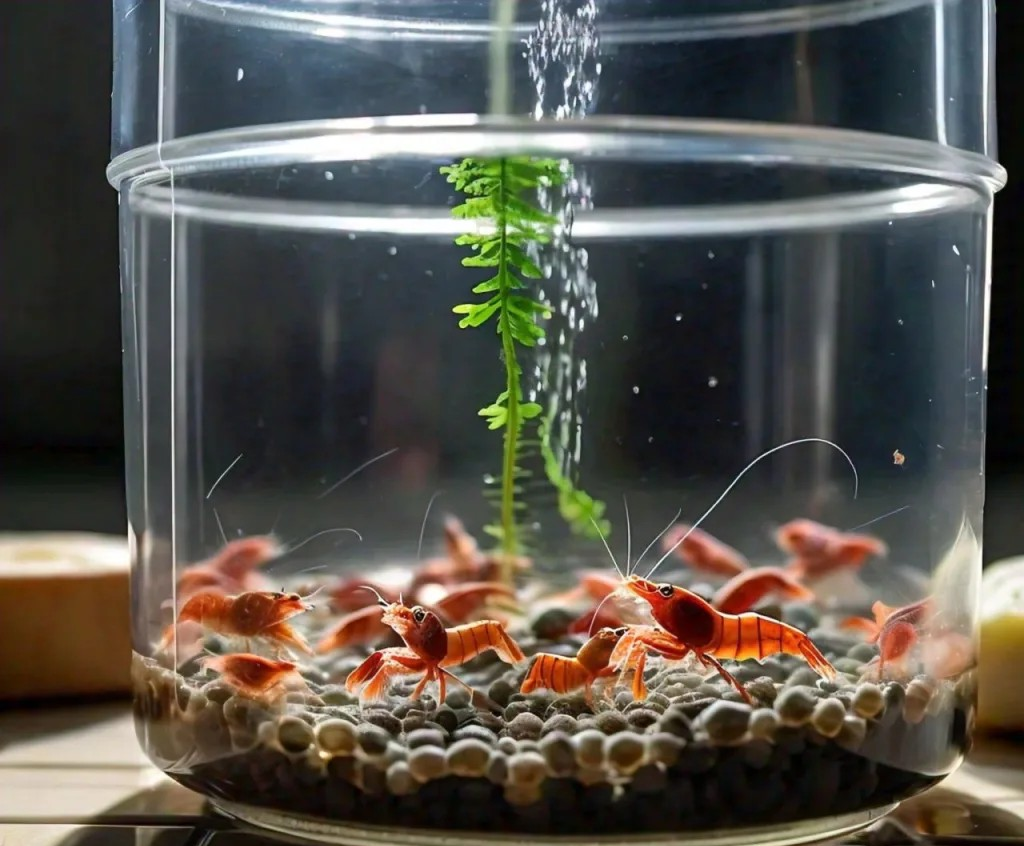
Mysis shrimp are a great food option for your fish. Here’s why they are beneficial:
- Nutritious: Mysis shrimp are packed with protein and essential nutrients, which help keep your fish healthy and strong.
- Natural Diet: Many fish eat small shrimp in the wild. Feeding them Mysis shrimp is similar to their natural diet.
- Boosts Color: These shrimp contain pigments that can enhance the color of your fish, making them look even more vibrant.
- Easy to Digest: Mysis shrimp are easy for fish to digest, which is good for their health.
- Variety: Adding Mysis shrimp to your fish’s diet provides variety, which can keep them more interested in their food.
To feed Mysis shrimp to your fish, you can buy them frozen or freeze-dried. Just follow the instructions on the package to prepare them. Your fish will love this tasty and nutritious treat!
Mosquito Larvae Live Food For Betta Fish
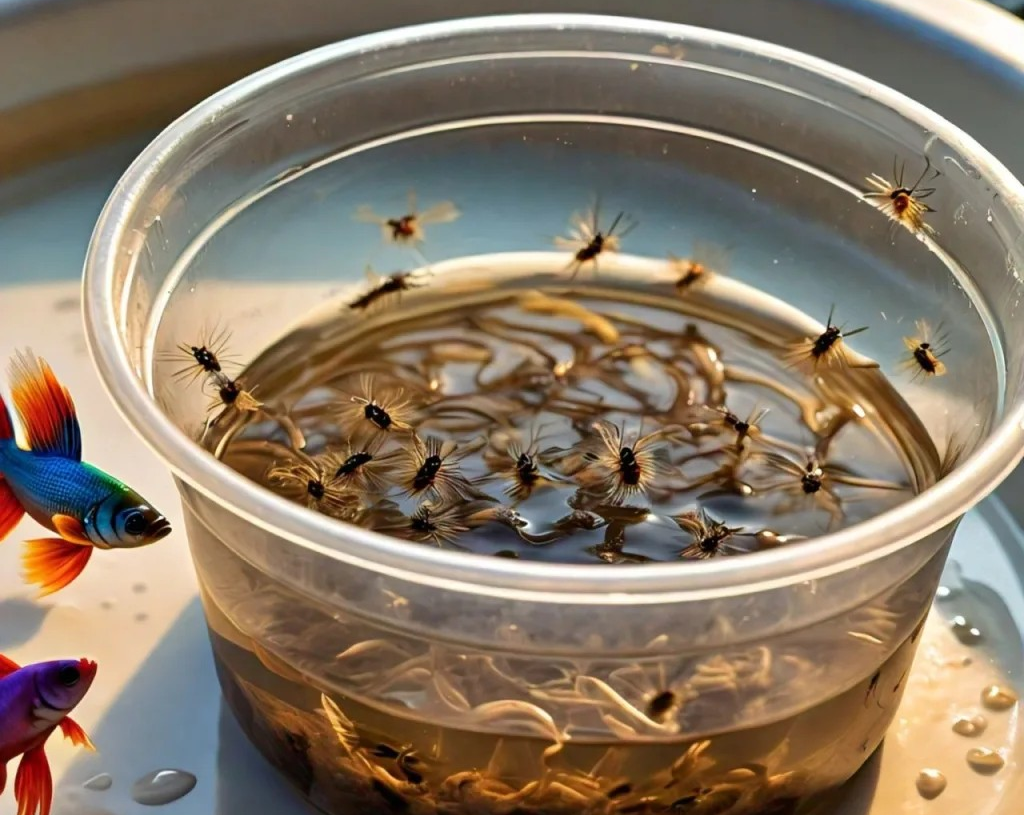
Mosquito larvae are a great food choice for your fish. Here’s why they are beneficial:
- Nutritious: Mosquito larvae are full of protein and other important nutrients that help keep your fish healthy and strong.
- Natural Diet: In the wild, many fish eat mosquito larvae, so feeding them this food is like giving them what they naturally eat.
- Boosts Activity: Fish love to hunt for mosquito larvae, which can keep them active and entertained.
- Easy to Find: You can collect mosquito larvae from standing water or buy them from pet stores, making them an easy and affordable food option.
- Size: They are the right size for many types of fish, making them a perfect fit for their diet.
- Good for Conditioning: Mosquito larvae are excellent for conditioning fish, especially if you’re preparing them for breeding. The high energy content helps boost their vitality and readiness.
To feed mosquito larvae to your fish, simply add a few to the tank. Your fish will quickly find and eat them, enjoying this tasty and healthy treat!
Just make sure to source them from clean water to avoid introducing any harmful substances to your tank.
Food Complications / Constipation
Feeding your betta fish is important, but sometimes it can lead to problems like constipation. Here’s what you need to know to avoid and handle these issues:
Common Food Complications
- Overfeeding: Giving your betta too much food can cause health problems. It’s best to feed them small amounts once or twice a day.
- Poor Diet: Betta fish need a balanced diet. If they eat only one type of food, they might not get all the nutrients they need.
- Bad Quality Food: Low-quality food can harm your betta’s health. Always choose high-quality, betta-specific pellets or flakes.
Signs of Constipation
Swollen Belly: A bloated appearance can be a sign your betta is constipatedLack of Appetite: A constipated betta may stop eating.
Preventing and Treating Constipation
Balanced Diet: Feed your betta a variety of foods, like high-quality pellets, frozen or live foods (such as brine shrimp or bloodworms), and occasional treats.
Avoid Overfeeding: Give them as much food as they can in about 2 minutes.
Fasting: Once a week, don’t feed your betta. This gives their digestive system a break and helps prevent constipation.
Treat with Peas: If your betta is constipated, feed them a small, peeled, cooked pea. This can help clear their digestive system.
Adjust Water Temperature: Keeping the water at a consistent, warm temperature (around 78-80°F or 25-27°C) helps with digestion.
By following these tips, you can help keep your betta fish healthy and avoid food-related complications.
How much and how often to feed betta fish?
Feeding your betta fish the right amount and at the right times is important for their health. Here’s a simple guide:
How Much to Feed
- Pellets: Give your betta 2-3 pellets per meal. Betta pellets expand in water, so they don’t need many.
- Live/Frozen Food: If you’re feeding them live or frozen food (like brine shrimp or bloodworms), give them a small pinch or a piece about the size of their eye.
How Often to Feed
- Twice a Day: Feed your betta twice daily, once in the morning and once in the evening.
- Avoid Overfeeding: Only feed them what they can eat in 2 minutes. If there is leftover food, you’re probably giving them too much.
Tips for Healthy Feeding
- Variety: Mix their diet with high-quality pellets, live food, and occasional treats.
- Fasting Day: Once a week, skip feeding for a day. This helps their digestive system stay healthy.
- Monitor Weight: If your betta looks bloated or overweight, cut back a little on the food.
Following these simple steps can keep your betta fish healthy and happy.
What If Your Betta Fish Won’t Eat?
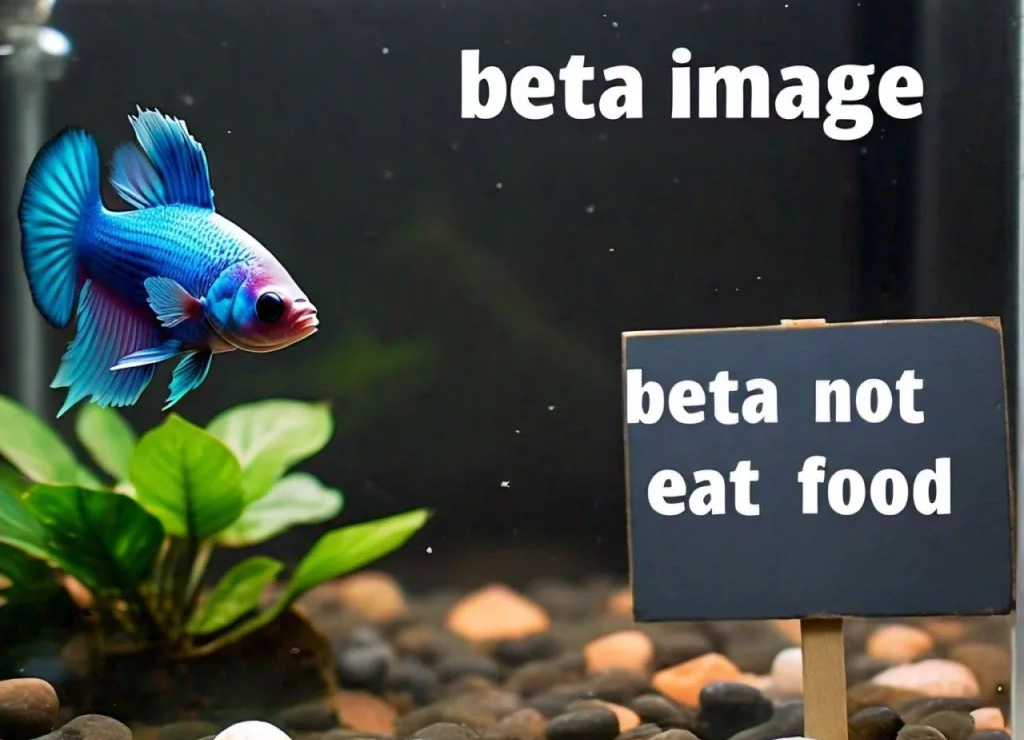
If your betta fish won’t eat, it can be worrying. Here are some simple steps to help figure out why and what you can do:
Check the Basics
1: Water Conditions: Make sure the water is clean and at the right temperature (around 78-80°F or 25-27°C). Poor water quality can make bettas sick and less interested in food.
2: Stress: Bettas can get stressed from changes in their environment, like new decorations or tank mates. Try to keep their surroundings calm and stable.
Food Issues
1: Food Type: Sometimes bettas don’t like certain foods. Try offering different types, like high-quality pellets, flakes, or live/frozen foods such as brine shrimp or bloodworms.
2: Old Food: Check the expiration date on the food. Stale food can lose its appeal and nutritional value.
Health Problems
1: Illness: Look for signs of sickness, like white spots, clamped fins, or unusual behavior. If you think your betta might be sick, consult a vet or pet store specialist.
2: Constipation: If your betta looks bloated, they might be constipated. Try not feeding them for a day or two, or give them a small, cooked, and peeled pea.
Other Tips
1: Routine: Bettas does well with a feeding routine. Try to feed them at the same time each day.
2: Patience: Sometimes bettas just have off days. If they skip a meal but seem healthy otherwise, give it time.
By checking these things, you can usually find out why your betta isn’t eating and help them return to their normal, healthy self.
FAQs
- What are the best betta foods?
1: High-Quality Pellets: These are specially made for bettas and are nutritious and easy to find.
2: Frozen/Live Food: Things like brine shrimp and bloodworms are great treats and mimic what they eat in the wild.
3: Flakes: Betta-specific flakes can be good, but pellets are usually better.
- What can I feed my betta fish that’s around my house?
Cooked Peas: A small piece of cooked, peeled pea can help if your betta is constipated.
Mosquito Larvae: If you have a safe source, mosquito larvae can be a natural and nutritious treat.
- What’s the best diet for my new betta fish?
Variety: Give them a mix of high-quality betta pellets and occasional frozen or live food treats like brine shrimp or bloodworms.
Routine: Feed them once or twice a day in small amounts.
- Can betta fish eat flies?
Yes, betta fish can eat flies. In the wild, they eat insects like flies. If you feed them flies, make sure the flies are clean and free of chemicals. Don’t give them too many; a balanced diet with betta pellets and occasional treats like brine shrimp or bloodworms is best.
- Which betta food (granules) do you think is the best?
Omega One Betta Buffet Pellets: Known for high-quality ingredients.
Hikari Betta Bio-Gold Pellets: Good for making your betta’s colors bright.
New Life Spectrum Betta Pellets: Well-balanced and nutritious.
- Are pellets a better option?
Yes: Pellets are made to give bettas all the nutrients they need. They are easy to measure and less messy than flakes
Conclusion
In conclusion, feeding your Betta fish the right food is essential for keeping it healthy and happy. Betta fish enjoy a variety of foods, including insect-based pellets, freeze-dried options like bloodworms and brine shrimp, fish flakes, wingless fruit flies, Mysis shrimp, and mosquito larvae. These foods provide essential nutrients, mimic their natural diet, and promote vibrant colors.
By following these guidelines, you can ensure your Betta fish stays healthy, colorful, and active, bringing joy to your home.
